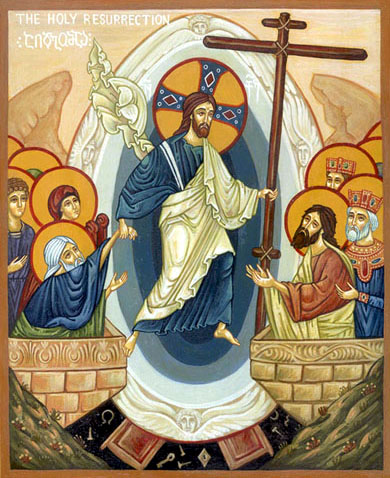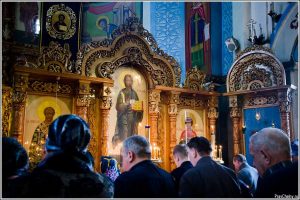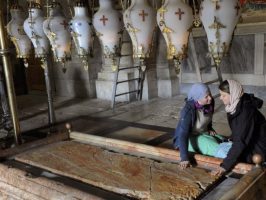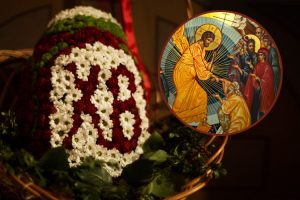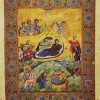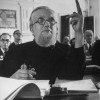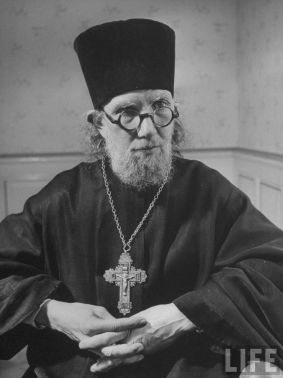 “This is the day which the Lord hath made; let us rejoice and be glad therein.” Pascha is the day of universal joy and peace. The entire world, every breath and all creation, triumphs and rejoices. For the Lord has conquered and destroyed death, abolishing the “dominion of death” – the power of death. With the Resurrection of Christ, the dawn of the coming general Resurrection has already begun to break over all creation, for we hope in “the life of the age to come.” Paschal joy is boundless, dissolving every sorrow and doubt. “Let no one lament their poverty, for the universal kingdom has been revealed.” All offences and distress are forgotten: “let us forgive all things on the Resurrection.” Not a single cloud of grief and dark memories should obscure the luminous and light-bearing Paschal night. Christ is Risen!
“This is the day which the Lord hath made; let us rejoice and be glad therein.” Pascha is the day of universal joy and peace. The entire world, every breath and all creation, triumphs and rejoices. For the Lord has conquered and destroyed death, abolishing the “dominion of death” – the power of death. With the Resurrection of Christ, the dawn of the coming general Resurrection has already begun to break over all creation, for we hope in “the life of the age to come.” Paschal joy is boundless, dissolving every sorrow and doubt. “Let no one lament their poverty, for the universal kingdom has been revealed.” All offences and distress are forgotten: “let us forgive all things on the Resurrection.” Not a single cloud of grief and dark memories should obscure the luminous and light-bearing Paschal night. Christ is Risen!
Yet the infinite and eternal joy of the Resurrection is mysterious. In its fullness it is beyond the capacity of each of us. This Divine Revelation of joy and glory so often catches us off guard, as it were, and spiritually unprepared. It is for this reason that the Church prepares us for the light-bearing day of Pascha through a long and penitential trial, leading us along the path of fasting and vigilance. Without this, the entire meaning of the Paschal victory would remain incomprehensible and inaccessible to us. Pascha completes Passion Week. And joy comes through the Cross. Eternal joy came into the world through the Cross of the Son of God, the agony in Gethsemane, and the voluntary passion and death of the Only-Begotten One on the Cross: “for behold, through the Cross joy hath come to all the world!” The Resurrection is intrinsically inseparable from the Cross, suffering, and death itself. And not only for us, but for Christ Himself, the “Prince of life.” Pascha is the mystery of the Life-Giving Tomb.
Passion Week is made up of days of agonizing memories. How painful it is to relive the entire ineffable mystery of Divine condescension anew, listening in deep spiritual confusion to the Gospel account of the Savior’s “final days of earthly life”! Everything is full of light, quietness, and Divine love: the Lord is saving the world. Therein lie our immutable trust, support, and hope. But how impenetrable, even for Divine love, is the night of sin. We are unable to feel the full measure of this utmost horror of sin, stagnation, and resistance. He came unto His own, and His own received Him not (John 1:11). Not only did they not receive Him, they rejected, repudiated, and condemned Him to death. One of the Twelve was a traitor. And how easily was the triumphant “Hosanna” followed from the very same mouths by the wild “Crucify Him”!
During the days of Passion Week the terrible abyss of fallen man’s sin, helplessness, and irresponsibility opens wide before us so clearly. The Church prompts us again and again to pass through this fright and horror. For the sin that raised the Savior onto Golgotha was not someone else’s sin, not “their sin,” but our common sin. As Metropolitan Philaret of Moscow explained, the Cross of Christ is, as it were, composed of all our sins; our unrighteousness makes up the weight that He bore. Sin is committed on earth, but it rattles the heavens. The Son of God came down upon the earth in order to raise up the Cross and to fit into a small tomb. Only when we have experienced the full extent of the inescapable gloom of sin can we draw closer to the joy of Pascha and experience the true joy of liberation: “the beginning of another life eternal.”
The Resurrection of Christ is the victory over death – over human death. For it is in man that death is the “wages of sin.” Having sinned, man began to die; that is, he began to stop being human. For man is not a bodiless spirit; and a disincarnate soul is not a whole person. God created man of soul and body, in indissoluble unity, for his eternal sojourn. Sin disrupted this unity, making human existence itself impossible. This is the true horror of death. Therefore it is the “enemy,” the “last enemy” in the words of the Apostle (1 Corinthians 15:26). Death is terrible not because it so often seems premature, suddenly interrupting our lives and the lives of loved ones, causing a sorrowful parting for us. Death is terrible because it reveals man’s doom, his inability on his own to be such as he (every man) should have been according to the creative plan of the Creator.
So, it is only in the Resurrection of Christ that this opportunity and ability were returned to man anew. The hopelessness of death has been repealed. The Lord descended into the very depths of the kingdom of death and abolished it, rising as the first-fruits of them that slept; following Him everyone shall be made alive in his own order (1 Corinthians 15:20, 23). The entire world is relieved through this victory: for all creation suffers from man’s mortality. Therefore Pascha is the universal victory and joy: the joy of earth and heaven.
For many of us this is unexpected and unusual; it may even appear to be inappropriate and vain philosophizing, inappropriate on the Bright Feast. But this is precisely what the Church sings and glorifies on this luminous night, in the entire cycle of Pentecost, and every Sunday. “We celebrate the death of death, the destruction of hades, the beginning of another life eternal.” And grief and joy are linked together: “Yesterday I was buried with Thee, O Christ; today I rise with Thine arising. Yesterday I was crucified with Thee; do Thou Thyself glorify me with Thee, O Savior, in Thy Kingdom.” Yesterday and today are inseparable: the Cross and the Resurrection. In is only under the light yoke of the Cross that we shall enter into the joy of our Lord, Risen in glory from the tomb of voluntary death.
“O Thou Who didst endure the Cross, and didst abolish death, and didst rise again from the dead: Make our life peaceful, O Lord, for Thou alone art almighty.”
Translated from the Russian.












